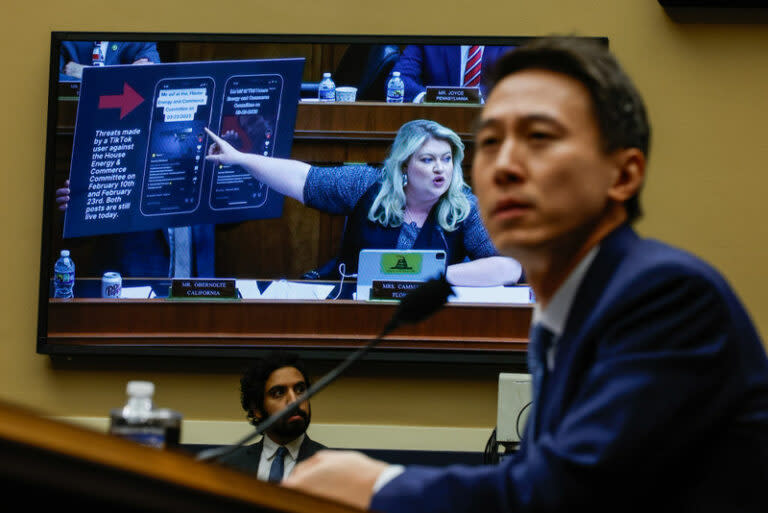Congress silenced free speech in TikTok law, platform tells federal court

- Oops!Something went wrong.Please try again later.
TikTok CEO Shou Zi Chew takes questions from Rep. Kat Cammack, R-Fla., before the House Energy and Commerce Committee in the Rayburn House Office Building on Capitol Hill on March 23, 2023 in Washington, D.C. (Photo by Chip Somodevilla/Getty Images)
TikTok and its parent company argued Thursday in a federal court in the District of Columbia that the recently enacted law forcing a nationwide ban or sale of the popular platform violates the First Amendment.
TikTok Inc., which operates the video-sharing service in the United States, and its parent company, ByteDance Ltd., which was founded by a Chinese national, filed a brief in the U.S. Court of Appeals for the D.C. Circuit calling the law President Joe Biden signed in April an unprecedented restriction on the constitutional right to free speech.
“Never before has Congress expressly singled out and shut down a specific speech forum,” the brief reads. “Never before has Congress silenced so much speech in a single act. “
Upholding such an “extraordinary speech restriction” would require the court to undertake “exacting scrutiny” of Congress’ action, but Congress provided only a hypothetical national security argument to advance the bill, the companies said.
“Congress gave this Court almost nothing to review,” the brief continues. “Congress enacted no findings, so there is no way to know why majorities of the House and Senate decided to ban TikTok.”
Many individual lawmakers who supported the law raised national security concerns, saying ByteDance’s relationship with the Chinese government meant the country’s Communist Party leaders could demand access to TikTok users’ private data.
They also said the platform, which the company says has 170 million users in the U.S., could be used to spread propaganda.
But under U.S. Supreme Court precedent, labeling speech as foreign propaganda does not allow the government to overlook First Amendment protections, TikTok said in its brief.
Speculation about how the app “might” or “could” be used, rather than any concrete examples of misconduct, do not clear the high bar required to restrict speech, the companies added.
“A claim of national security does not override the Constitution,” the companies wrote Thursday.
A spokesperson for the Justice Department, which is defending the law, highlighted the intelligence community’s national security concerns with TikTok and said the law was consistent with the First Amendment.
“This legislation addresses critical national security concerns in a manner that is consistent with the First Amendment and other constitutional limitations,” the spokesperson wrote in a statement to States Newsroom. “We look forward to defending the legislation in court.
“Alongside others in our intelligence community and in Congress, the Justice Department has consistently warned about the threat of autocratic nations that can weaponize technology – such as the apps and software that run on our phones – to use against us. This threat is compounded when those autocratic nations require companies under their control to turn over sensitive data to the government in secret.”
Response to lawmakers
The brief said Congress had not included any official findings of harm from TikTok, but several individual members raised specific concerns about the kind of speech found on the platform.
The companies said Thursday those specific complaints bolstered the argument that TikTok is being denied free speech protections.
The brief cited several lawmaker statements:
U.S. Sen. Mitt Romney, a Utah Republican, U.S. Rep. Raja Krishnamoorthi, an Illinois Democrat who is ranking member on the House Select Committee on China, and former Rep. Mike Gallagher, a Wisconsin Republican who chaired the panel, said the platform’s algorithm fed an overwhelming share of pro-Palestinian content over videos that favor Israel.
Sen. Tom Cotton, a Republican from Arkansas, said the platform “exposes children to harmful content.”
Sen. John Fetterman, a Democrat from Pennsylvania, said the law would “make TikTok safer for our children and national security.”
Nebraska Republican Sen. Pete Ricketts noted the popularity of the hashtag #StandwithKashmir, which protests a policy of India, a geopolitical rival of China.
“Legislators’ perception of the content reflected on TikTok was misinformed,” the companies said. “But well-founded or not, governmental policing of content differences is antithetical to the First Amendment.”
Oral arguments in September
Both chambers of Congress passed the law with bipartisan votes as part of a package that included aid to Israel and Ukraine. Biden signed the measure April 24.
TikTok pledged to sue and filed its legal challenge last month.
Tuesday’s brief expands on the company’s arguments. The government’s response is due July 26 and oral arguments are scheduled for Sept. 16.
Divestment unworkable, TikTok says
TikTok and ByteDance said Thursday the provision in the bill to avoid a ban by divesting the service to a company without ties to China is unworkable, especially within the nine-month timeline required by the law.
Such a move would be technically complex, requiring years of engineering work, the companies said. It would also isolate the U.S. user base from the rest of the world, limiting revenue from advertisements.
And even if it were feasible from a technical or business standpoint, selling the platform would likely be rejected by the Chinese government, which has the authority to block exportation of technology developed in the country, the companies said.
The post Congress silenced free speech in TikTok law, platform tells federal court appeared first on NC Newsline.

